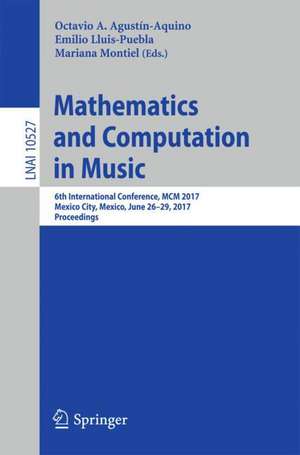Mathematics and Computation in Music: 6th International Conference, MCM 2017, Mexico City, Mexico, June 26-29, 2017, Proceedings: Lecture Notes in Computer Science, cartea 10527
Editat de Octavio A. Agustín-Aquino, Emilio Lluis-Puebla, Mariana Montielen Limba Engleză Paperback – 18 noi 2017
Din seria Lecture Notes in Computer Science
- 20%
 Preț: 1061.55 lei
Preț: 1061.55 lei - 20%
 Preț: 307.71 lei
Preț: 307.71 lei - 20%
 Preț: 438.69 lei
Preț: 438.69 lei - 20%
 Preț: 645.28 lei
Preț: 645.28 lei -
 Preț: 410.88 lei
Preț: 410.88 lei - 15%
 Preț: 580.46 lei
Preț: 580.46 lei - 17%
 Preț: 427.22 lei
Preț: 427.22 lei - 20%
 Preț: 596.46 lei
Preț: 596.46 lei -
 Preț: 449.57 lei
Preț: 449.57 lei - 20%
 Preț: 353.50 lei
Preț: 353.50 lei - 20%
 Preț: 1414.79 lei
Preț: 1414.79 lei - 20%
 Preț: 309.90 lei
Preț: 309.90 lei - 20%
 Preț: 583.40 lei
Preț: 583.40 lei - 20%
 Preț: 1075.26 lei
Preț: 1075.26 lei - 20%
 Preț: 310.26 lei
Preț: 310.26 lei - 20%
 Preț: 655.02 lei
Preț: 655.02 lei - 20%
 Preț: 580.93 lei
Preț: 580.93 lei - 20%
 Preț: 340.32 lei
Preț: 340.32 lei - 18%
 Preț: 938.83 lei
Preț: 938.83 lei - 20%
 Preț: 591.51 lei
Preț: 591.51 lei - 15%
 Preț: 438.59 lei
Preț: 438.59 lei - 20%
 Preț: 337.00 lei
Preț: 337.00 lei -
 Preț: 389.48 lei
Preț: 389.48 lei - 20%
 Preț: 607.39 lei
Preț: 607.39 lei - 20%
 Preț: 1024.44 lei
Preț: 1024.44 lei - 20%
 Preț: 579.30 lei
Preț: 579.30 lei - 20%
 Preț: 763.23 lei
Preț: 763.23 lei - 20%
 Preț: 453.32 lei
Preț: 453.32 lei - 20%
 Preț: 575.48 lei
Preț: 575.48 lei - 20%
 Preț: 585.88 lei
Preț: 585.88 lei - 20%
 Preț: 825.93 lei
Preț: 825.93 lei - 20%
 Preț: 763.23 lei
Preț: 763.23 lei - 17%
 Preț: 360.19 lei
Preț: 360.19 lei - 20%
 Preț: 1183.14 lei
Preț: 1183.14 lei - 20%
 Preț: 340.32 lei
Preț: 340.32 lei - 20%
 Preț: 504.57 lei
Preț: 504.57 lei - 20%
 Preț: 369.12 lei
Preț: 369.12 lei - 20%
 Preț: 583.40 lei
Preț: 583.40 lei - 20%
 Preț: 343.62 lei
Preț: 343.62 lei - 20%
 Preț: 350.21 lei
Preț: 350.21 lei - 20%
 Preț: 764.89 lei
Preț: 764.89 lei - 20%
 Preț: 583.40 lei
Preț: 583.40 lei - 20%
 Preț: 649.49 lei
Preț: 649.49 lei - 20%
 Preț: 341.95 lei
Preț: 341.95 lei - 20%
 Preț: 238.01 lei
Preț: 238.01 lei - 20%
 Preț: 538.29 lei
Preț: 538.29 lei
Preț: 422.25 lei
Preț vechi: 527.80 lei
-20% Nou
Puncte Express: 633
Preț estimativ în valută:
80.80€ • 84.59$ • 66.85£
80.80€ • 84.59$ • 66.85£
Carte tipărită la comandă
Livrare economică 05-19 aprilie
Preluare comenzi: 021 569.72.76
Specificații
ISBN-13: 9783319718262
ISBN-10: 3319718266
Pagini: 356
Ilustrații: XI, 373 p. 147 illus.
Dimensiuni: 155 x 235 mm
Greutate: 0.54 kg
Ediția:1st ed. 2017
Editura: Springer International Publishing
Colecția Springer
Seriile Lecture Notes in Computer Science, Lecture Notes in Artificial Intelligence
Locul publicării:Cham, Switzerland
ISBN-10: 3319718266
Pagini: 356
Ilustrații: XI, 373 p. 147 illus.
Dimensiuni: 155 x 235 mm
Greutate: 0.54 kg
Ediția:1st ed. 2017
Editura: Springer International Publishing
Colecția Springer
Seriile Lecture Notes in Computer Science, Lecture Notes in Artificial Intelligence
Locul publicării:Cham, Switzerland
Cuprins
Primal-Circular Substitutions.- On the Group of Transformations of Classical Types of Seventh Chords.- Pairwise Well-Formed Modes and Transformations.- Homometry in the Dihedral Groups: Lifting Sets from Zn to Dn.- A Symmetric Quantum Theory of Modulation in Z20.- Almost Difference Sets in Transformational Music Theory.- Algebra of Harmony.- Developing Software for Dancing Tango in Compás.- Using Inharmonic Strings in Musical Instruments.- Real-Time Compositional Procedures for Mediated Soloist-Ensemble Interaction: The Comprovisador.- Strange Symmetries.- Interval Content vs. DFT.- Probing Questions about Keys: Tonal Distributions through the DFT.- Abstract Gestures: A Unifying Concept in Mathematical Music Theory.- Mathematical Music Theory and the Musical Math Game – Two Creative Ontological Switches.- Hamiltonian Graphs as Harmonic Tools.- New Investigations in Rhythmic Oddity.- Polytopic Graph of Latent Relations: A Multiscale Structure Model for Music Segments.- Dynamic Time Warping for Automatic Musical Form Identification in Symbolical Musical Files.- Identification and Evolution of Musical Style I: Hierarchical Transition Networks and their Modular Structure.- A Fuzzy-Clustering Based Approach for Measuring Similarity Between Melodies.- The Evolution of Tango Harmony, 1910-1960.- Determination of Compositional Systems through Systemic Modelling.- A Cluster Analysis for Mode Identification in Early Music Genres.- Cross Entropy as a Measure of Coherence and Uniqueness.- Complementary Collection and Ligeti’s Combinatorial Tonality.- Probabilistic Generation of Ragtime Music from Classical Melodies.- Using Probabilistic Parsers to Support Composition of Salsa Music.
Caracteristici
Includes supplementary material: sn.pub/extras
